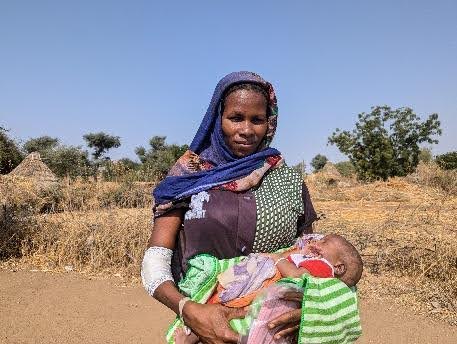
In Sudan’s Darfur region, being pregnant can mean risking your life.
As conflict continues to tear through the country, health systems have crumbled.
In West and Central Darfur, hospitals lie in ruins or have shut down entirely after repeated attacks.
The few facilities still functioning are overwhelmed and under-resourced.
For pregnant women, especially those living far from urban centers, accessing care is a near-impossible feat.
Many women give birth at home, not out of choice but because war and poverty have left them no alternative. Roads are unsafe, transport is scarce and expensive, and health facilities are few and far between.
As a result, most women only seek help after complications arise—when it’s often too late.
“The biggest difficulty is how to manage to bring food to my children,” said a 35-year-old woman recovering at Murnei hospital in West Darfur.
“I was working a lot when I was pregnant, and that is maybe why my baby was born weak. Access to healthcare was also difficult—but MSF helped.”
For some, help never arrives.
“One mother gave birth at home and couldn’t remove the placenta,” recalls Wendemagegn Tefera Benty, Project Medical Referent at Zalingei hospital.
“She was bleeding. The family carried her for a full day on foot. By the time they reached the hospital, she had already died.”
Sameera Abkir, 25, survived giving birth at home in her village of Ab Doui, but her health quickly deteriorated afterward.
“I gave birth at home. It wasn’t easy,” she said.
“After the delivery, I developed a severe fever. My brother went to the pharmacy, got some injections, and gave them to me. But then my hand started to hurt. I didn’t know what was wrong.”
Sameera made the difficult decision to travel to Zalingei hospital—first for a birth certificate for her baby, but also in the hope of finding relief from the pain.
“I didn’t come alone—my husband came with me. We traveled by cart because the hospital is far, too far to walk. The journey was difficult, but I had no choice,” she said.
“In my neighborhood, most women give birth at home.”
According to the World Health Organization (WHO), over 70% of health facilities in conflict-affected areas like Darfur are barely operational or entirely closed. In the face of one of the world’s worst humanitarian crises, millions are cut off from even the most basic care.
Zalingei Hospital, supported by Médecins Sans Frontières (MSF), is the only referral center for around 500,000 people. It’s the sole facility in the region handling deliveries, performing more than 40 emergency caesarean sections each month.
Afaf Omar Yahya, 35, knows this struggle all too well. When labor pains struck at home, there was no car, no ambulance—only a donkey. She rode for hours in agonizing pain, finally arriving at Zalingei hospital.
“When I got there, the doctor told me I had lost the baby,” she said. “They had to perform an emergency caesarean. Losing the baby was the greatest heartbreak for me.”
Her story is not unique.
“Most complications we receive are from home births or anaemia during pregnancy,” explained Virginie Mukamiza, Midwife Activity Manager at Zalingei.
Beyond maternal deaths, the conflict is feeding a wider crisis. Malnutrition, poverty, and fear are creating a deadly loop that continues to endanger women and girls.
Many mothers are left physically and emotionally shattered—and too often, without their children.
MSF is calling for immediate and unhindered access for humanitarian aid and healthcare.
The organization urges warring parties to allow safe passage for civilians seeking medical care and stresses the need for renewed donor engagement to fund emergency response efforts.
Médecins Sans Frontières operates in ten out of Sudan’s 18 states and has been witnessing the grave toll that the war has taken on women and their health in Darfur and across the country.













